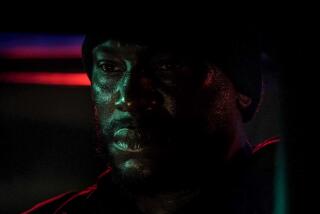War Is Hell, Even If It’s Revolutionary
- Share via
After meticulously guarding against historical inaccuracy, “The Patriot” has been unexpectedly blindsided by political correctness. What’s all the fuss? Children and guns.
During a crucial scene in the Revolutionary War epic, Mel Gibson and his two adolescent boys rescue his eldest son (Heath Ledger) from British capture. His 11-year-old son (Trevor Morgan) kills a soldier with a musket.
“Is it socially responsible to show an 11-year-old firing a gun?” That was the question asked again and again of Gibson and the filmmakers during recent interviews.
“I don’t have a problem with it,” Gibson replied. In fact, he said he wouldn’t hesitate to do the same with his children under similar circumstances.
“As a parent with two young sons and a son on the way, I’m worried about their moral development,” said screenwriter Robert Rodat. “I’m not worried about the depiction of realistic violence with realistic repercussions in R-rated movies [like “The Patriot”]. The moral and personal cost to the victim and the persons committing the violence is illuminating, dramatically worthwhile and responsible.
‘We Wanted to Make It Real’
“In the very next scene, you have the boy telling his father that he enjoyed killing. And the look of dread on Mel’s face shows us the repercussion of their actions. What scares me is violence that is realistically depicted with no repercussions.”
Producer Mark Gordon (“Saving Private Ryan”) admitted that the Motion Picture Assn. of America was bothered by the scene. It was one of the contributing factors to the film’s R-rating (along with the shot of a cannonball decapitating a rebel soldier and Gibson brutally stabbing a British soldier with his tomahawk during the rescue of Ledger).
“I have to tell you--maybe it’s me--but I don’t give it a second thought,” Gordon said. “Like anyone trying to tell a story in the most effective way, you don’t get wrapped up in political correctness. We are not putting guns in the hands of 11-year-olds today. And so we’re forgiven that, by virtue of the fact that it was a different time and place. Extraordinary circumstances lead to extraordinary behavior.
“But the fact of the matter is, people were getting married when they were 14, and they were hunting, and that’s how they lived. I hope people will be caught up enough in the drama and the emotion of the story that that’s not something that will linger. We wanted to make it real.”
The filmmakers also defended Gibson’s brutal stabbing of the British officer, suggesting it was the most dramatically effective way to depict his violent nature.
“Does he have to stab this dead man so many times?” Gordon asks. “The answer is yes, he does. Not because we like seeing a dead man being stabbed 20 or 30 times, but because that is the depth of his pain. That’s how he’s expressing it. . . . If you don’t feel the horror of the violence, then you’re not giving the drama the chance to really move you.”
Viewers may be even more surprised by the violent nature of British Green Dragoon commander Col. Tavington (Jason Isaacs), who enthusiastically slaughters men in battle and burns or hangs townspeople without hesitation. We are unaccustomed to seeing such British brutality on film, yet the filmmakers (who were assisted by the Smithsonian Institution) insist that the representation is accurate.
Just as Gibson’s Benjamin Martin is a composite of five real-life militia leaders, Tavington is largely drawn from Lt. Col. Banastre Tarleton, known as “Bloody Ban” and “The Butcher.” He was renowned for killing every patriot, whether he surrendered or not, and his maniacal actions were referred to as “Tarleton’s Quarters.”
How to Show War’s Moral Imperatives
“The one thing you are constantly struck by in reading about the southern campaign is the number of atrocities and their horrific nature committed by the British, particularly the loyalist militia, but the British troops as well,” Rodat said.
“There’s one famous incident that took place in Georgia. A number of men under militia commander Eligah Clark were captured by the loyalist British commander and hanged in his stairwell so . . . he could watch them from his bed.”
However, Rodat said he tried not to “purely demonize” the British by providing Lord Gen. Charles Cornwallis (Tom Wilkinson) with a self-deceiving, aristocratic sense of honor. “He sincerely tries to wage a difficult conflict according to the rules of war in decent behavior. It’s the nutty contradiction of war. How can war be decent and indecent at the same time? It’s a strange juxtaposition of moral imperatives that defines us as human beings.”
More to Read
Only good movies
Get the Indie Focus newsletter, Mark Olsen's weekly guide to the world of cinema.
You may occasionally receive promotional content from the Los Angeles Times.










